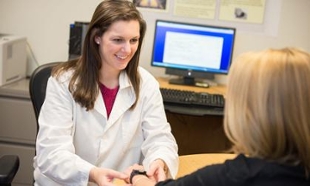Student researcher puts spotlight on sleep deprivation issues
News
After staying up late to study for finals last year, senior psychology major Caroline Cooke needed a nap. Sitting in her sleep research lab, she had an idea — with sleep being one of the main predictors of student success in college, why doesn't JMU have a place for students to catch a nap on campus? In the following months, she dedicated her time to researching the benefits of naps and the issues that accompany sleep deprivation.
"Our current research is focusing on the general health metric to see how the population of JMU is sleeping as a whole and how that plays into stress levels," said Cooke, who came to JMU with an interest in market research but decided to go into psychology to take a more scientific approach to studying people's behavior. The idea is to see how impulsive students are before and after naps and how taking a short nap can affect risky behavior.
Overseen by Dr. Jeff Dyche, associate professor of psychology, Cooke and her research team use a variety of techniques to measure sleep patterns. ActiGraph sleep monitors, watch-like devices that measure the body's circadian rhythm, a 24-hour cycle, collect data from study participants. By using this research tool, researchers can determine when and how well people sleep in a more objective way than simply filling out a sleep survey.
The implementation of The Nap Nook, a permanent area for students to nap on campus, is a result of Cooke's research and serves as her senior capstone project. Students can sign up for naps online or in person for up to 40 minutes. The ideal time to nap is 20-30 minutes, but the 40-minute slots allow for students to settle in and fall asleep. "The main goal is for people to recognize the value of a daytime nap and to see that it might minimize or negate the need for stimulants like caffeine and/or prescriptions," said Cooke.
"Sleep deprivation is correlated with health-related problems and it should be taken as seriously as any other unhealthy behavior like smoking or heavy drinking," said Cooke. By giving students a designated place to catch up on sleep, Cooke and her team hope to decrease the negative stereotypes of napping on campus and show students that the more they nap the more productive they will be. "It's crazy to see how even a 10-minute nap can make such a big difference in your day."
And students are listening. Since its opening this fall, The Nap Nook has served almost 900 students. Along with the physical space for napping is a campaign started by Cooke called "Revive The Sleep Deprived" to educate students on the facts of sleep deprivation.
Research indicates that after approximately 21 hours without sleep, the side effects are equivalent to a blood alcohol content of .10 percent, which is higher than the legal driving limit in Virginia. Students should know just how important sleep is not only to their performance in school, but also their physical well-being.
"We can't just function at this high level of performance when we are tired. Just like your phone when it's out of battery, we need to recharge ourselves too," said Cooke.
Cooke plans to graduate this spring, but would like to stay at JMU to carry on her campaign and research to oversee a sleep hygiene reform on campus.
"I became interested in sleep research because at first glance it looks so passive, it seems like your most passive state of existence but it's really your most active state, there is so much going on under the surface."
For more information on Cooke's research and The Nap Nook visit www.jmunapnook.com
By Melissa Mowery ('14)


